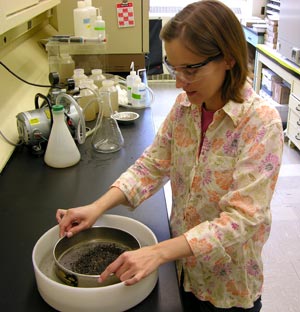Sarah O’Brien
2008 Wesely Award Winner Digs into Soil for Answers to Global Climate Change Questions

Sarah O’Brien, winner of the 2008 Marvin L. Wesely Distinguished Graduate Research Environmental Fellowship Award, sieves soil at Argonne National Laboratory.
New professor Dr. Sherri Morris arrived at Bradley University as Sarah O’Brien was in the last year of her undergraduate studies and brought just what O’Brien had been wanting—a class in soil ecology, which combined her interests in biology and geology. Working in Dr. Morris’ research lab and presenting a poster at a Soil Ecology Society meeting that year solidified O’Brien’s career path in her mind. From that time on, she was set to be a soil ecologist.
Today, O’Brien is a participant in the Global Change Education Program (GCEP), which was established by the U.S. Department of Energy’s (DOE) Office of Biological and Environmental Research (BER) to promote undergraduate and graduate training in support of DOE’s global change research activities.
Also a Ph.D. candidate in biological sciences at the University of Illinois at Chicago (UIC), O’Brien is exploring how tallgrass prairie land formerly used for farming rebuilds organic matter, or humus, that was lost through cultivation. Understanding a process known as carbon sequestration is the aim of her thesis research being conducted under the direction of Dr. Miquel Gonzalez-Meler of UIC.
Carbon sequestration refers to how soil functions as a repository for carbon captured by plants in the form of carbon dioxide, or CO2. During photosynthesis, plants use some of the CO2 to make tissue and energy and redirect some of it to the ground to make roots. The roots ultimately die and decompose, with part of the carbon remaining in the soil as organic matter. By that process, a portion of the human-generated CO2 is mopped up. CO2 has been named by the Intergovernmental Panel on Climate Change as the cause of global climate change.
While plants function as collectors of CO2 and the soil serves as its storage place, which can help lessen the effects of global climate change, the lion’s share of the improvement must come from reduced emissions, O’Brien said.
As global climate change accelerates, the significance of soil is likely to be multifaceted, affecting not only the capturing of CO2, but also food production through farming, water resources and bio-energy production, according to O’Brien. She said she hopes the research that she and her DOE mentor Dr. Julie Jastrow are conducting at Argonne National Laboratory near Chicago will contribute to a complete body of knowledge that can be used in wisely managing the limited resource of soil.
O’Brien and Dr. Jastrow are measuring soil organic matter in a series of restored prairies at the Fermi National Accelerator Laboratory near Batavia, IL. “By studying a system very closely, we might start to understand the mechanisms that control soil organic matter dynamics and be able to predict how other systems will behave,” O’Brien said.
O’Brien has relied heavily on soil samples archived at Argonne and the research Dr. Jastrow has conducted on the Fermilab prairies since 1985. “She saves everything, which has provided unique and exciting opportunities to explore how the soil organic matter changes over time,” O’Brien said. "By measuring soil carbon in samples taken from almost exactly the same spot over twenty years, I have been able to more accurately estimate soil carbon accumulation rates.”
O’Brien’s dedication has earned her the honor of winning the 2008 Marvin L. Wesely Distinguished Graduate Research Environmental Fellowship (GREF) Award. The GREF program began in June 1999 under GCEP to support graduate students in BER-funded collaborative global change research at universities and national laboratories. O’Brien has been a GREF Fellow since fall 2005. To win the Wesely award, she was chosen from among the GREF participants and nominated for making the best use of DOE facilities and mentors as part of her GREF thesis research.
Looking into the future, O’Brien plans to continue digging for answers to the many questions raised by global climate change. “I have really enjoyed my experience at Argonne National Laboratory, so my ideal job would be working as a scientist at a national lab. My goal is to continue doing research.”
